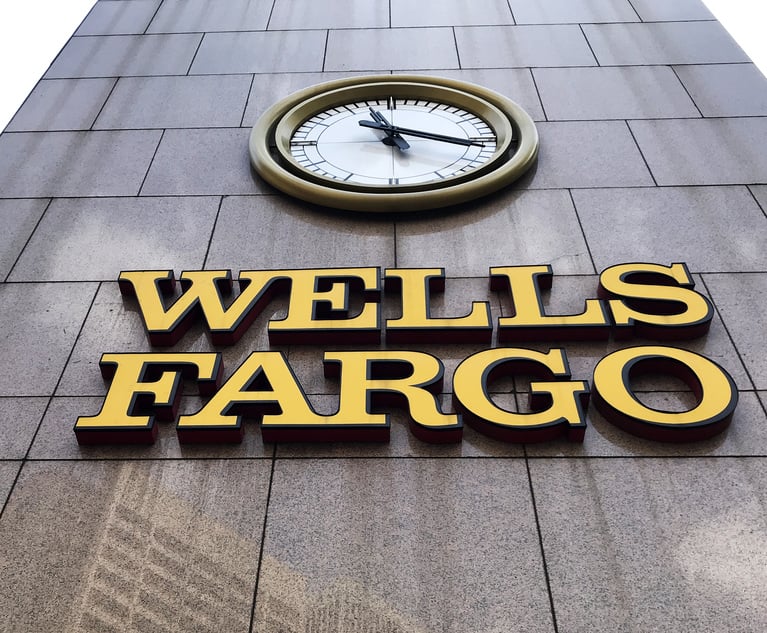 Wilmington Trust.
Wilmington Trust. Ex-Wilmington Trust Executives Free on Bail Pending Third Circuit Appeal
U.S. Judge Richard G. Andrews of the District of Delaware on Wednesday granted bail pending appeal to the executives, who were convicted last year on charges related to a massive reporting scandal that hid hundreds of millions of dollars in bad loans from investors and federal regulators.
February 27, 2019 at 06:06 PM
3 minute read
The original version of this story was published on Delaware Law Weekly
Four former Wilmington Trust executives, all facing multiyear sentences stemming from the bank's 2011 collapse, will remain out of prison while they appeal their criminal convictions, a Delaware federal judge has ruled.
U.S. District Judge Richard G. Andrews of the District of Delaware on Wednesday granted bail pending appeal to the executives, who were convicted last year on charges related to a massive reporting scandal that hid hundreds of millions of dollars in bad loans from investors and federal regulators.
In December, Andrews sentenced the bank's former president, Robert V.A. Harra, and David Gibson, who served as the bank's chief financial officer, each to six years and ordered them to pay $300,000 in fines. William North, Wilmington Trust's lead credit officer, and Kevyn Rakowski, the bank's former controller, received sentences of four and a half years and three years, respectively.
All four have appealed their convictions to the U.S. Court of Appeals for the Third Circuit and had been free on bail, awaiting Andrew's decision. The appeals process is expected to take up to a year to resolve.
Requests for bail pending appeal are rarely granted in criminal cases, but can sometimes be appropriate when federal defendants are determined not to be a flight risk and their appeals raise issues that would at least result in a new trial.
Federal prosecutors did not dispute that the executives were unlikely to flee, but challenged assertions from defense counsel that the appeals turned on substantial issues of law. The defendants, meanwhile, have honed in on instructions Andrews had issued to the jury, which they said worked in the government's favor.
On Wednesday, Andrews said a key ruling earlier in the case was ”fairly debatable” and that a reversal would mean, “at a minimum,” that the convictions would need to be vacated.
“I still think I am right. But the fact that a government banking agency seemed to take a different view gives me pause,” he wrote in a four-page order.
Kenneth Breen, a Paul Hastings attorney who represents Gibson, said he was “pleased that the court recognized the substantial issue that we will now take to the Third Circuit.”
Harra, Gibson, North and Rakowski were convicted last May on 15 counts of fraud and conspiracy for failing to report the amount of toxic and past-due loans on Wilmington Trust's books between October 2009 and November 2010.
According to a 2015 indictment, Wilmington Trust avoided mandatory disclosures to the U.S. Securities and Exchange Commission and the Federal Reserve Bank by “waiving” matured loans from the reporting requirements for past due loans.
Prosecutors said that by the end of 2009, the bank reported just $10.8 million of the $344.2 million in commercial real estate loans that were past due by 90 days or more, giving investors and regulators a false impression of the Delaware financial institution's health.
Under pressure to eliminate the past due and matured loans, the executives hatched a plan to “mass-extend” more than 800 commercial loans worth around $1.3 billion. Once the public learned the scope of the toxic loans, Wilmington Trust was purchased in a fire sale by M&T Bank in November 2010 for just $3.84 per share.
Prosecutors had wanted the defendants to self-report to prison this month.
This content has been archived. It is available through our partners, LexisNexis® and Bloomberg Law.
To view this content, please continue to their sites.
Not a Lexis Subscriber?
Subscribe Now
Not a Bloomberg Law Subscriber?
Subscribe Now
NOT FOR REPRINT
© 2024 ALM Global, LLC, All Rights Reserved. Request academic re-use from www.copyright.com. All other uses, submit a request to [email protected]. For more information visit Asset & Logo Licensing.
You Might Like
View All
FTX Estate Seeks to Recoup $1.76B From Binance, Plus Exec 'Piggy Bank' Payouts
3 minute read
Wells Fargo Seeks Declaratory Judgment Against 'YGC' Debt Collection Copyright Claim
4 minute read
Antitrust Lawsuit Alleges Scheme to Block Digital-Wallet Competitors, Monopolize Cash Access at US Casinos

Securities Litigation Cases Continued to Decline Nationally in 2023, Report Finds
Trending Stories
- 1Latest Class of Court Officers Sworn into Service in New York
- 2Kirkland's Daniel Lavon-Krein: Staying Ahead of Private Equity Consolidation
- 3Many Southeast Law Firms Planned New, Smaller Offices in 2024
- 4On the Move and After Hours: Goldberg Segalla, Faegre Drinker, Pashman Stein
- 5Recent FTC Cases Against Auto Dealers Suggest Regulators Are Keeping Foot on Accelerator
Who Got The Work
Michael G. Bongiorno, Andrew Scott Dulberg and Elizabeth E. Driscoll from Wilmer Cutler Pickering Hale and Dorr have stepped in to represent Symbotic Inc., an A.I.-enabled technology platform that focuses on increasing supply chain efficiency, and other defendants in a pending shareholder derivative lawsuit. The case, filed Oct. 2 in Massachusetts District Court by the Brown Law Firm on behalf of Stephen Austen, accuses certain officers and directors of misleading investors in regard to Symbotic's potential for margin growth by failing to disclose that the company was not equipped to timely deploy its systems or manage expenses through project delays. The case, assigned to U.S. District Judge Nathaniel M. Gorton, is 1:24-cv-12522, Austen v. Cohen et al.
Who Got The Work
Edmund Polubinski and Marie Killmond of Davis Polk & Wardwell have entered appearances for data platform software development company MongoDB and other defendants in a pending shareholder derivative lawsuit. The action, filed Oct. 7 in New York Southern District Court by the Brown Law Firm, accuses the company's directors and/or officers of falsely expressing confidence in the company’s restructuring of its sales incentive plan and downplaying the severity of decreases in its upfront commitments. The case is 1:24-cv-07594, Roy v. Ittycheria et al.
Who Got The Work
Amy O. Bruchs and Kurt F. Ellison of Michael Best & Friedrich have entered appearances for Epic Systems Corp. in a pending employment discrimination lawsuit. The suit was filed Sept. 7 in Wisconsin Western District Court by Levine Eisberner LLC and Siri & Glimstad on behalf of a project manager who claims that he was wrongfully terminated after applying for a religious exemption to the defendant's COVID-19 vaccine mandate. The case, assigned to U.S. Magistrate Judge Anita Marie Boor, is 3:24-cv-00630, Secker, Nathan v. Epic Systems Corporation.
Who Got The Work
David X. Sullivan, Thomas J. Finn and Gregory A. Hall from McCarter & English have entered appearances for Sunrun Installation Services in a pending civil rights lawsuit. The complaint was filed Sept. 4 in Connecticut District Court by attorney Robert M. Berke on behalf of former employee George Edward Steins, who was arrested and charged with employing an unregistered home improvement salesperson. The complaint alleges that had Sunrun informed the Connecticut Department of Consumer Protection that the plaintiff's employment had ended in 2017 and that he no longer held Sunrun's home improvement contractor license, he would not have been hit with charges, which were dismissed in May 2024. The case, assigned to U.S. District Judge Jeffrey A. Meyer, is 3:24-cv-01423, Steins v. Sunrun, Inc. et al.
Who Got The Work
Greenberg Traurig shareholder Joshua L. Raskin has entered an appearance for boohoo.com UK Ltd. in a pending patent infringement lawsuit. The suit, filed Sept. 3 in Texas Eastern District Court by Rozier Hardt McDonough on behalf of Alto Dynamics, asserts five patents related to an online shopping platform. The case, assigned to U.S. District Judge Rodney Gilstrap, is 2:24-cv-00719, Alto Dynamics, LLC v. boohoo.com UK Limited.
Featured Firms
Law Offices of Gary Martin Hays & Associates, P.C.
(470) 294-1674
Law Offices of Mark E. Salomone
(857) 444-6468
Smith & Hassler
(713) 739-1250






